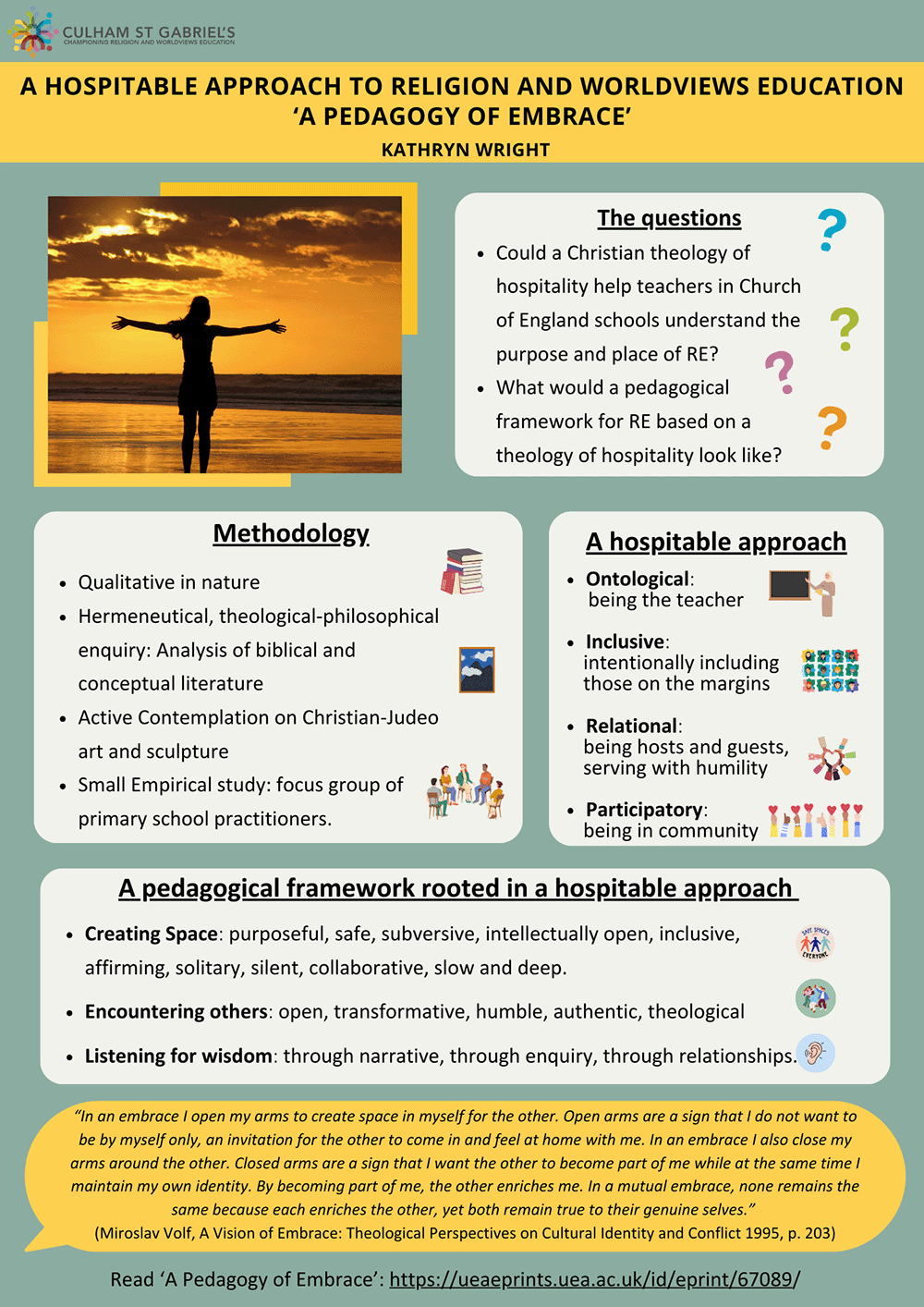Download a transcript of Kathryn’s film
What would a hospitable approach to religion and worldviews education look like?
Questions for consideration:
- How might I approach teaching and learning through a lens of hospitality?
- What does creating space, encountering others and listening for wisdom look like in my classroom?
At the heart of a religion and worldviews approach to religious education is the responsibility of the educator to enable children and young people to navigate an increasingly complex, multi religious, multi secular and an increasingly unsettled world.
My own doctoral research considered a hospitable approach to the teaching of religious education which I believe aligns well with this new paradigm. My thesis, A Pedagogy of Embrace (2017) developed pedagogical principles for teaching RE based on a Christian theology of hospitality.
First, hospitality provides an ontological approach. It is about being the teacher; it is about one’s presence in the classroom. Hospitality is about the physical space, but it is far more about who we are and how we serve. At the heart of a religion and worldviews approach is the need for teachers (and pupils) to bring themselves and their own worldview and position to the classroom. Secondly, it is inclusive. Hospitality, seeks to intentionally include those on the margins; listening and engaging with voices of those often unheard. This resonates with the de-colonising of the curriculum and with a focus on lived experiences of worldview communities. Thirdly, hospitality is by nature relational. It involves a host and guests. In A Pedagogy of Embrace, the notion of the host being the guest, and vice versa is put forward. I believe, this removes the power dynamic and facilitates genuine dialogue and conversation. This places the teacher in a position of humility, where they are serving their pupils, and at the same time may be served by them or learn from them. This acknowledges the value of everyone’s worldview, seeing the importance of learning from one another as well as from the subject itself. Lastly, hospitality is by nature participatory. One cannot stand on the sidelines and observe, or if one did it would appear very rude. Imagine no one speaking at the dinner table! I believe, teachers and pupils are to be ‘in community’ with what they are learning. This is at the heart of a religion and worldviews approach. One brings oneself to the subject, participating in it ontologically, relationally and inclusively from a position of humility. A religion and worldviews approach is fundamentally interpretive as we interact with the subject, rather than sitting as an observer on the sidelines. Taking a religion and worldviews approach means we participate in interpreting knowledge; we don’t stand as observers anymore.
I put forward three pedagogical principles, which exemplify this hospitable approach:
- Creating space
- Encountering others
- Listening for wisdom
The visual analogy of an embrace is helpful for considering the practical application of a hospitable approach. Miroslav Volf, a Croatian Protestant theologian, defines an embrace in the following way:
In an embrace I open my arms to create space in myself for the other. Open arms are a sign that I do not want to be by myself only, an invitation for the other to come in and feel at home with me. In an embrace I also close my arms around the other. Closed arms are a sign that I want the other to become part of me while at the same time I maintain my own identity. By becoming part of me, the other enriches me. In a mutual embrace, none remains the same because each enriches the other, yet both remain true to their genuine selves. (Volf 1995, p. 203)
For Volf, an embrace must have the four elements or ‘acts’. These are opening the arms, waiting, closing the arms and then opening them again. The open arms indicate creation of space and invitation. Waiting suggests acceptance of reciprocity; the embrace is not an act of invasion. Closing the arms indicates the host is guest and the guest is host as each person makes their presence felt. Volf sees this as especially powerful because the identity of the self is both preserved and transformed. Lastly, the opening of the arms shows that the two people have not become one but remain two with their difference and uniqueness.
This is a powerful way of understanding the interactions within the religion and worldviews classroom. The sense of insufficiency or having ‘open arms’ means that one needs to have space; to be in some sense empty. I cannot come to a religion and worldviews classroom with a closed mind; I must come open to listen and encounter. I must be intellectually humble. This to me speaks to our own worldviews, including our personal faith (where appropriate), being always incomplete, ever changing. Everything around us impacts on how we see and make sense of the world, including for some relationship with the Divine.
Kathryn Wright
CEO, Culham St Gabriel’s
Access my PhD thesis: A pedagogy of embrace : a theology of hospitality as a pedagogical framework for religious education in Church of England schools
